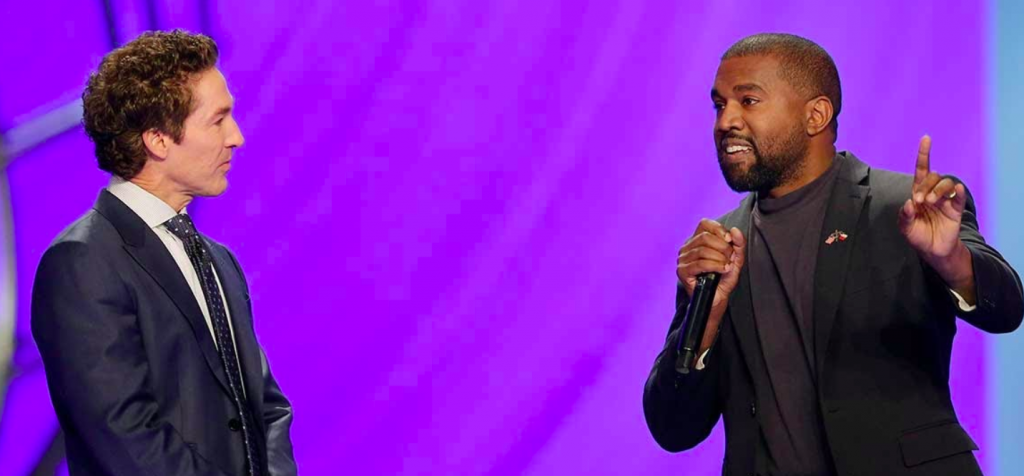Kanye West exists as a polarizing figure whose talent and alleged genius is always being debated. Nevertheless, through this new album cycle for Jesus is King, a new debate has arisen — whether his declared Christianity is legitimate.
Jesus is King received the stamp of approval from Jenn Johnson on Instagram. Johnson is one of the most prominent faces and voices of Bethel Music, a contemporary worship group that’s part of Bethel Church, a megachurch in Redding, California. It’s also one of the biggest, most popular worship groups in Christian music right now, aside from Elevation Worship and the ever-present Hillsong Worship — one of many branches of Hillsong’s musical empire in Christian music. Johnson’s Instagram post holds weight, and could give Kanye credit among Bethel’s fans and Christian base, which has a large age range. Bethel, Hillsong and Elevation are three of the most popular megachurches in Christian circles.
Each of these churches, with the exception of Bethel, typically have multiple campuses in various cities, usually with large congregations. Megachurches are not a monolith, but can often be viewed that way due to the existence of televangelism and common themes in certain churches — such as celebrity pastors, high social media presence and popular worship groups. Modern evangelical megachurches now boast high-tech sound systems, colorful lyric and logo graphics and worship teams that sell out stadiums across the country. While these are all great tools for outreach and bringing the message of Christianity to many, there’s a risk the message can be lost in the experience of it all. Why do megachurches matter in this case of Kanye West? He recently paid a visit to Lakewood Church in Texas, a popular non-denominational Christian megachurch — pastored by Joel Osteen, one of the most recognizable televangelists, which are evangelical pastors whose main medium of outreach is through televised services or appearances.
Joel Osteen has been pastor of Lakewood since 1999, and has since become one of the most visible televangelists of the past decade — and a polarizing figure in conversations about faith, evangelicalism and more. Osteen, despite his message, is no stranger to controversy. In 2017, he came under fire for not opening Lakewood Church as a shelter in the aftermath of Hurricane Harvey, considered one of the worst hurricanes to hit the region.
So, why does Osteen matter? Kanye visited Lakewood Church for a special Jesus is King-themed service in November of last year, and the two announced a Sunday Service tour, set to occur this year. They’ll be bringing Kanye’s Sunday Service choir along for the ride. What’s ironic is that long before the lead-up to the release of Jesus is King, Sunday Service was, essentially, an exclusive, private gospel concert only visible to the public through clips provided by Kim Kardashian or invitees. From the outside, it looks like a great experience — swaying choir members singing with passion, Kanye smiling at the piano and masses fixed in poses of reverence while singing gospel standards or reworks of rap songs — including Kanye’s own discography. But, as many Christians or non-believers have wondered, is it a publicity stunt or is Kanye actually dedicated to really bringing his faith to his well-established fanbase?
None of this is to nitpick Kanye. It’s not to disparage any outreach or any of the good things Lakewood Church has done. The issue lies in that no matter how sincere Kanye’s newfound or ongoing faith is, much of Sunday Service and its campaign still feels like a commodification of the Black church experience, as well as Christianity in general. The addition of Joel Osteen, who has often been accused of peddling a misleading version of Christian doctrine called “the prosperity gospel,” adds to the murky optics of the situation as a whole.
The prosperity gospel is a theology that states that as long as humans have faith, God will provide them with security and blessings — especially financial ones. Many megachurches like Lakewood, and televangelists like Osteen, have either subtly or covertly espoused this in their brand and in their sermons. Televangelism, with its wide reach through Christian TV channels like TBN, only allows for the proliferation of this. Even though televangelism has allowed for Christian doctrine to spread to regions far and wide, the prosperity gospel aspect has been peddled so much that it’s saturated many with the idea that faith is easy, and that monetary gifts and Instagram-ready motivational sermons strengthen one’s faith. This leads to further misrepresentation of the faith, and those within it, and could possibly do damage to anyone interested.
The Christian life does indeed include blessings, as well as prosperity, but it is not solely that — it is much deeper. It is meant to be a relationship between God and humanity, because though sin separated humanity from Him, God provided a way for humanity to be reunited with him through his Son, Jesus Christ. But in Osteen’s version of things, there’s hardly any explanation for things like sin or its consequences. This type of misrepresentation doesn’t help those who want a deeper relationship with God or feel lost when life gets tough. It doesn’t help those who may feel alienated by the church, or Christians who struggle with their identity or the global church’s reputation.
If Kanye truly wants to use his platform to make Christian rap and promote Christian music, ideals and faith, why not collaborate with the figures who have worked tirelessly to have Christian rap accepted in Christian circles and beyond? Why not work in Christian rap so that it is no longer viewed as a wayward, forgotten piece of Christian music? Artists like Lecrae, Andy Mineo, KB, Tedashii and more have held it down over the last decade. Part of Christianity is fellowship, and though all of Kanye’s uplifting of his faith is appreciated and recognized, that specific action would be a better use of his platform. Because, as the Scripture says, “faith, without works is dead.”
“14 What good is it, my brothers and sisters, if someone claims to have faith but has no deeds? Can such faith save them? 15 Suppose a brother or a sister is without clothes and daily food. 16 If one of you says to them, ‘Go in peace; keep warm and well fed,’ but does nothing about their physical needs, what good is it? 17 In the same way, faith by itself, if it is not accompanied by action, is dead.”- James 2:14-17
Kanye is talented, no doubt — but performative faith will not help him or anyone he’s trying to positively influence.










Comments are closed.